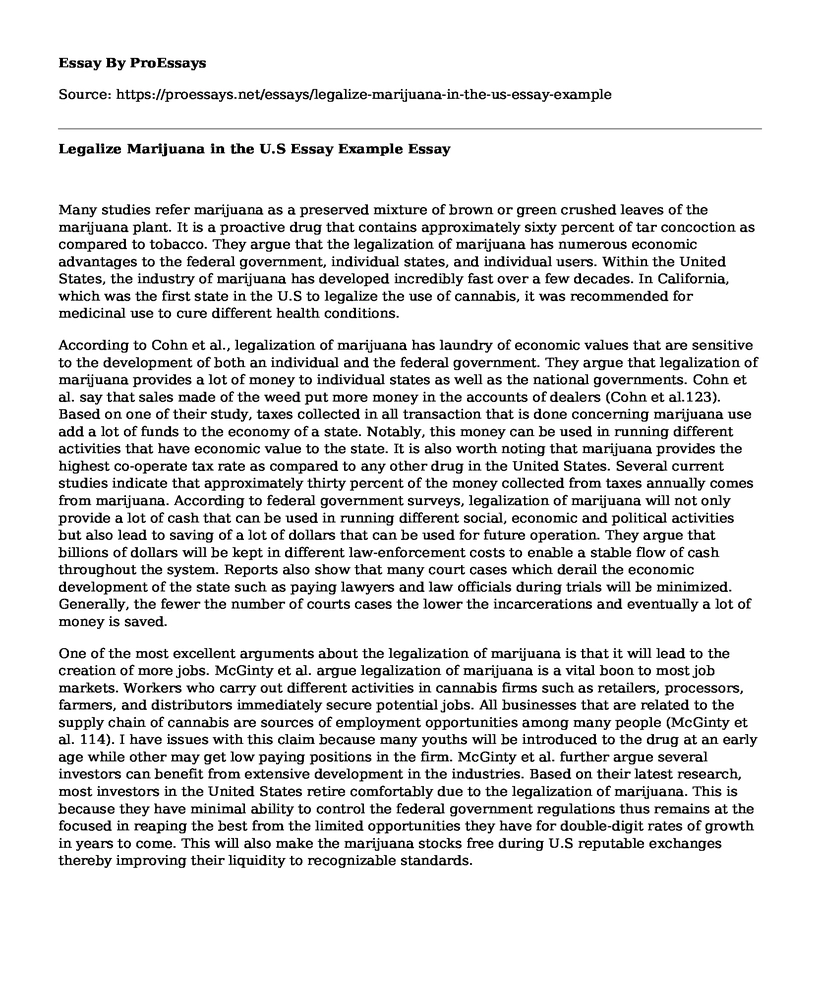Many studies refer marijuana as a preserved mixture of brown or green crushed leaves of the marijuana plant. It is a proactive drug that contains approximately sixty percent of tar concoction as compared to tobacco. They argue that the legalization of marijuana has numerous economic advantages to the federal government, individual states, and individual users. Within the United States, the industry of marijuana has developed incredibly fast over a few decades. In California, which was the first state in the U.S to legalize the use of cannabis, it was recommended for medicinal use to cure different health conditions.
According to Cohn et al., legalization of marijuana has laundry of economic values that are sensitive to the development of both an individual and the federal government. They argue that legalization of marijuana provides a lot of money to individual states as well as the national governments. Cohn et al. say that sales made of the weed put more money in the accounts of dealers (Cohn et al.123). Based on one of their study, taxes collected in all transaction that is done concerning marijuana use add a lot of funds to the economy of a state. Notably, this money can be used in running different activities that have economic value to the state. It is also worth noting that marijuana provides the highest co-operate tax rate as compared to any other drug in the United States. Several current studies indicate that approximately thirty percent of the money collected from taxes annually comes from marijuana. According to federal government surveys, legalization of marijuana will not only provide a lot of cash that can be used in running different social, economic and political activities but also lead to saving of a lot of dollars that can be used for future operation. They argue that billions of dollars will be kept in different law-enforcement costs to enable a stable flow of cash throughout the system. Reports also show that many court cases which derail the economic development of the state such as paying lawyers and law officials during trials will be minimized. Generally, the fewer the number of courts cases the lower the incarcerations and eventually a lot of money is saved.
One of the most excellent arguments about the legalization of marijuana is that it will lead to the creation of more jobs. McGinty et al. argue legalization of marijuana is a vital boon to most job markets. Workers who carry out different activities in cannabis firms such as retailers, processors, farmers, and distributors immediately secure potential jobs. All businesses that are related to the supply chain of cannabis are sources of employment opportunities among many people (McGinty et al. 114). I have issues with this claim because many youths will be introduced to the drug at an early age while other may get low paying positions in the firm. McGinty et al. further argue several investors can benefit from extensive development in the industries. Based on their latest research, most investors in the United States retire comfortably due to the legalization of marijuana. This is because they have minimal ability to control the federal government regulations thus remains at the focused in reaping the best from the limited opportunities they have for double-digit rates of growth in years to come. This will also make the marijuana stocks free during U.S reputable exchanges thereby improving their liquidity to recognizable standards.
Conclusion
Swif also argues that legalization of marijuana will lead to an extensive reduction in cannabis costs, thereby making it affordable (Swif 123). I have a pertinent issue with this claim because it might threaten the federal government who are interested in tax collection and the stellar stocks which rely on exchanges; it will make cannabis affordable to patients who want to use it for medicinal purposes. According to health researchers, cannabis products such are cannabidiol oil which is beneficial to patients with different disease and health problem my find opportunity to access the drug.
Works Cited
Cohn, Amy M., et al. "Support for marijuana legalization and predictors of intentions to use marijuana more often in response to legalization among US young adults." Substance use & misuse 52.2 (2017): 203-213.
McGinty, Emma E., et al. "The emerging public discourse on state legalization of marijuana for recreational use in the US: Analysis of news media coverage, 2010-2014." Preventive medicine 90 (2016): 114-120.
Swift, Art. "Support for legal marijuana use up to 60% in the US." Gallup Social Issues (2016).
Cite this page
Legalize Marijuana in the U.S Essay Example. (2022, Oct 25). Retrieved from https://proessays.net/essays/legalize-marijuana-in-the-us-essay-example
If you are the original author of this essay and no longer wish to have it published on the ProEssays website, please click below to request its removal:
- Investigation of Crime Essay Example
- Marijuana Legalization: Should We Take the Leap? - Essay Sample
- Essay Example on Examining Juvenile Recidivism in Single-Parent Households
- Essay Sample on Incarcerated Women: Challenges Beyond the Jail Walls
- Mass Shootings: It Happened Again Cartoon Represents the Realities of Growing U.S. Incidences - Essay Sample
- Obama Care: US Healthcare Reforms and Its Impact - Essay Sample
- Book Review Example on The Hot House Life Inside Leavenworth Prison







